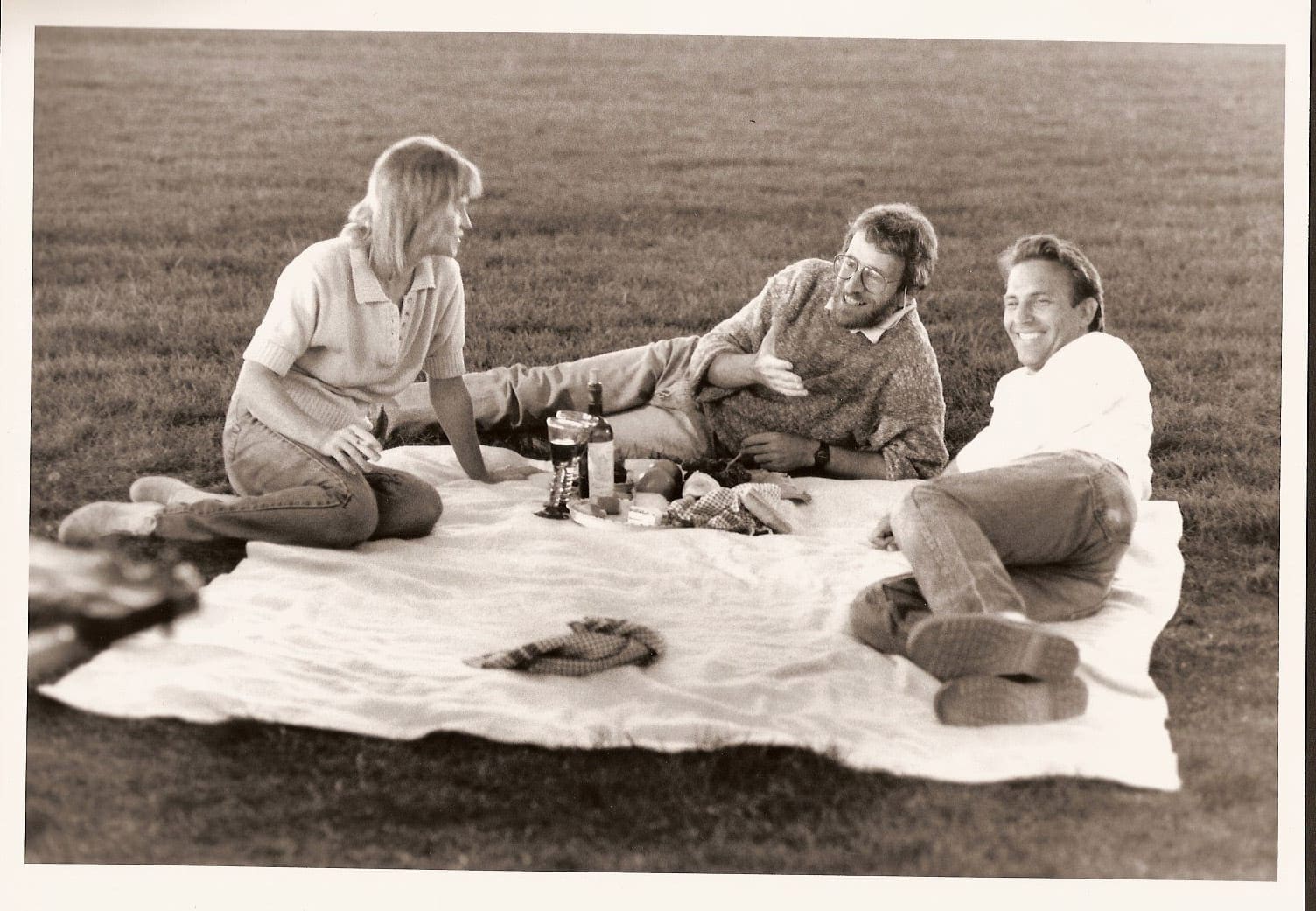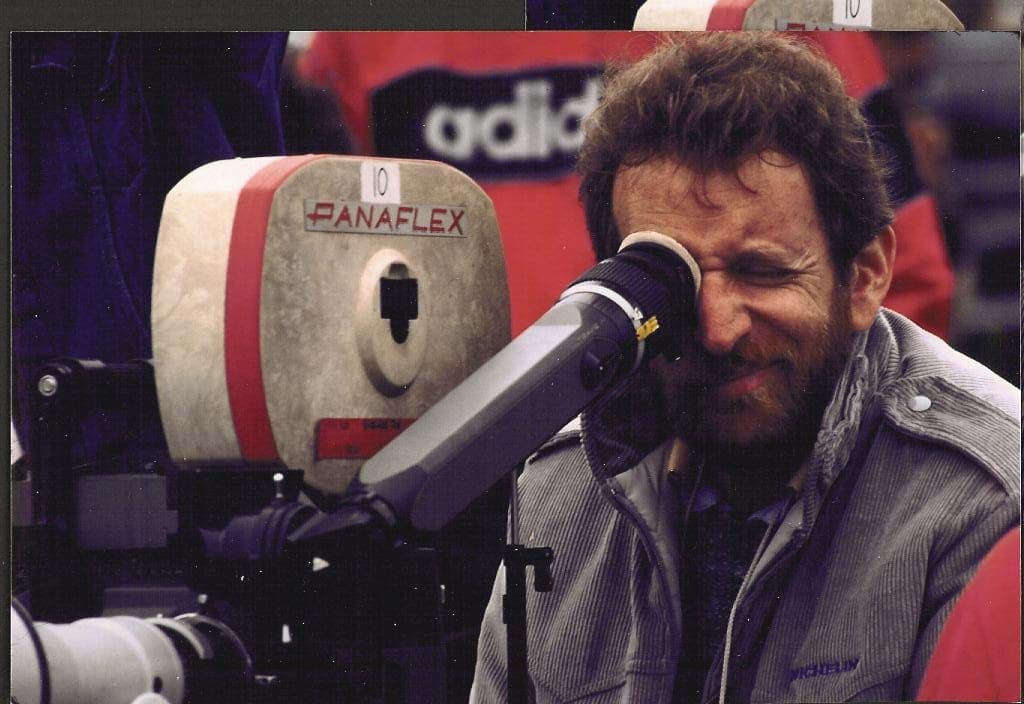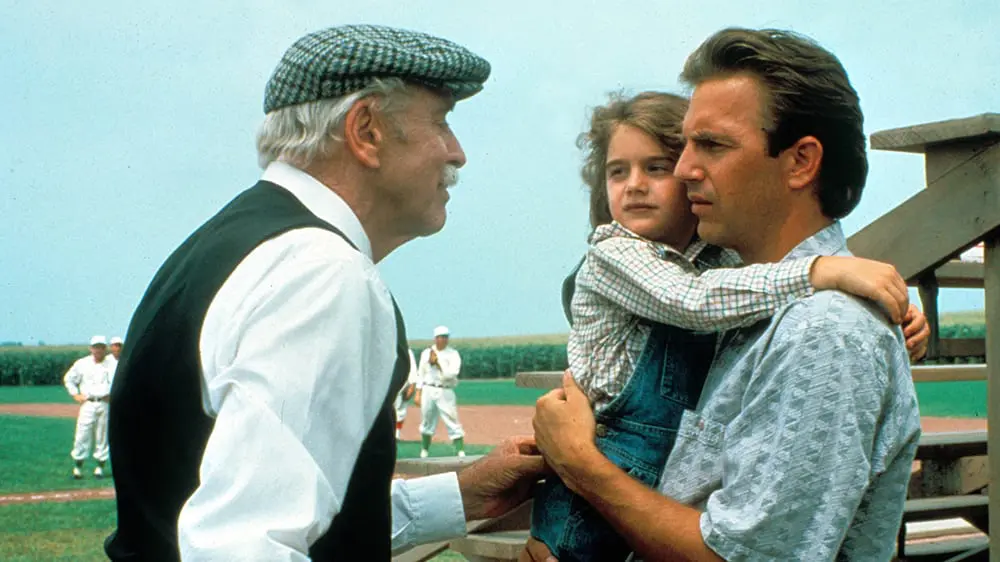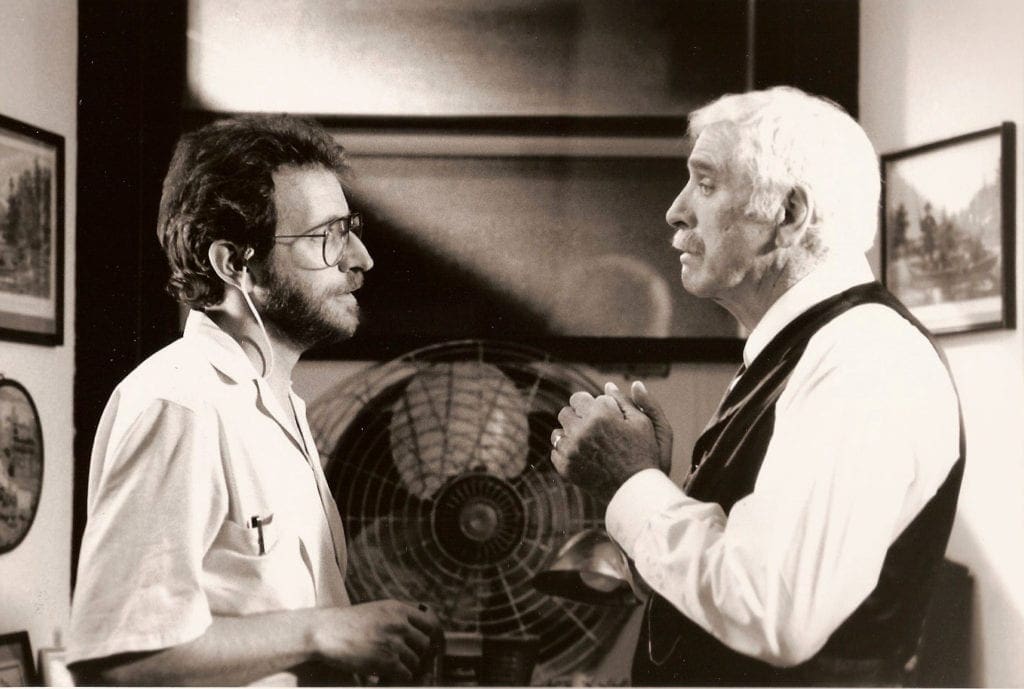On Field of Dreams 30th Anniversary, Director Phil Alden Robinson Reveals How a 1960s Attitude Tweak Created a Magical Film

This weekend, Field of Dreams celebrates its 30th Anniversary by returning to theaters for a special Father’s Day screening June 16 and 18 as part of the TCM Big Screen Classic with Fathom Events. Truly, it’s hard to name a movie that’s more appropriate for that holiday – in fact, it’s a movie that will make the most hardhearted lug shed tears. Director Phil Alden Robinson talked to me about what makes the movie so magical.
‘80s Movie Guide: Tell me what was it about the book “Shoeless Joe” that captured your imagination and you knew you wanted to make a movie from it?
Phil Alden Robinson, writer-director of Field of Dreams: The book wasn’t like anything I’d ever read before it had such original situations and characters. There’s a moment, I think it’s on page 2 in the book when Ray says to his wife after hearing the voice once, “I think I have to plow under our corn and build a baseball field.” And, I was all ready for the wife to do the stereotypical “oh, you can’t do that.” But in the book she says, ‘Well, if you feel you have to, then do it.’ And I thought, wow, I’ve never seen this character before. It was really the character of the wife that first opened my eyes to realizing something very different was going on with this story.
“It was really the character of the wife that first opened my eyes to realizing something very different was going on with this story. “
’80sMG: Annie is the most supportive wife in the world – tell me about crafting Annie and was there ever anyone who wanted you to write her differently?
Phil Alden Robinson: What’s interesting is that in my first draft, I did what the book did, which is, Ray hears the voice once, goes to her and says I need to do this and she says okay. What worked in the book did not work in the screenplay. I realized I needed to give Ray – not Annie, but Ray – a little more doubt…I needed him to acknowledge for the audience, “Okay, this is nuts, I really can’t do that.” That’s why he hears the voice a few more times. It was saying to the audience, we know this is crazy, we acknowledge that, and come along for the ride.
‘80sMG: This film is so different, especially different than what we see now. Tell me about the fight, if there was one, to get this movie made.
Phil Alden Robinson: It wasn’t much of a fight, they all just said no.
“I have a framed letter on my office wall that’s a piece of coverage from one of the studios saying you can’t make a movie out of this, it would just seem ridiculous.”
It really took Larry Gordon, who was at Fox, and Scott Rudin, who was working with them – both very smart, interesting guys – they loved the book and they took the leap of faith with me that we could make it into a movie. It didn’t seem to me to be so far-fetched. When I read the book, I just kept seeing these really visual scenes and really compelling characters and surprises every few pages. The plot would carry in a way that the very best movies do. I always thought, this is such a movie. It just took some executives who understood that who saw it also.
80sMG: Do you think that’s what J.D. Salinger saw in it as well and was so quick to act to prevent being a character in the film? [In the book, J.D. Salinger is the author Ray seeks out to join him on the journey.]
Phil Alden Robinson: The publisher of the book got a letter from Salinger when the book was published saying, “We reserve our right to take action if you exploit this book in any other medium.” What’s interesting is that in that letter it says, “Our client protests this fictitious and sentimental portrait of himself.†And, I thought, that’s perfect. He’s really pissed off that it was sentimental!
“Interestingly enough, I didn’t want to use J.D. Salinger in the film anyway.”
’80sMG: (Laughs)
Phil Alden Robinson: I thought it would take you out of the movie. I thought, we’ve asked the audience to take enough of a leap of faith with us and now to have someone play J.D. Salinger felt like one crazy thing too far. So from the first draft, I’d always envisioned a different character in that role.
‘80sMG: I thought it might’ve given more attention to J.D. Salinger, the fact that he protested it, which then everyone would know.
Phil Alden Robinson: The funny thing is that’s what Bill Kinsella said [the author of “Shoeless Joe”]: “What fascinated me about Salinger is that he made himself more famous by rejecting fame!” And that interested Bill, so Bill wrote about that. And Bill found in two Salinger stories, a character named John Kinsella. Bill thought, that’s my in. I’ll name the main character after myself and he finds these Salinger characters named after his father.
‘80sMG: So, you fictionalize J.D. Salinger and make him an entirely different character. What about the other real-life ballplayers you then had to fictionalize? What was the responsibility you felt, or did you feel any?
Phil Alden Robinson: We used the names of the original Black Sox players. We took real liberties with portraying them. Certainly, Shoeless Joe in the movie speaks with real eloquence, almost poetically. In real life I think he was illiterate, he certainly wasn’t someone who spoke that way. But, it was a work of fiction so I didn’t really mind. We got a little bit of criticism from a small corner of people that Ray Liotta batted right-handed when the real Shoeless Joe batted left-handed. I have to say, I truly didn’t care.
“There’s nobody alive who has seen Shoeless Joe swing a bat.”
But, everybody has seen a professional baseball player swing a bat, and I had an actor who looked like a professional baseball player when he swung a bat from the right side, but not from the left side. So, it was a pretty easy decision for me. When we did get the criticism, I remember saying to someone, you know, there is a bigger inaccuracy no one has picked up on in how we portrayed Shoeless Joe: the real Shoeless Joe Jackson is dead and we show him walking around, talking to people! It’s fiction, folks!
‘80sMG: Well, that brings up…I love the quantum physics of it all! Tell me about the thinking that went into the timelines. Back to the Future and Bill and Ted, and all these time travel movies…they think very deeply about it! Did you think about it?
Phil Alden Robinson: I did think about it and what I finally came around to believe is that the less we explain and the less logical framework we gave to the magic, the more magical it will be. What we’re asking for the audience is to not sign on to our version of events, but just experience something that doesn’t have an explanation and see where that takes you – because that’s the journey the main character has to go on. Ray is not given by the voice a road map, or an explanation, or a logical underpinning for what he has to do. He’s just told to take a leap of faith, do this thing he knows is crazy, and see what happens. And, I thought that to be true to that vision, we had to do that also. We had to say to the audience, we’re not going to tell you what it means, who the voice is, where it comes from, and why it’s talking to him.
Someone at the studio came up with the whole quantum physics of it all, and I said, “I don’t know where this magic comes from. If I knew and I put it in the movie, I think it would hurt the movie.”
“I think it’s better letting the audience decide for themselves what it means.”
And, we did change things. “Moonlight†Graham actually died in the late ‘60s and I had him die in 1972 simply because I wanted to have a Nixon poster in the shot.
‘80sMG: Why was that?
Phil Alden Robinson: Well, I gave Ray and Annie a little more background in the ‘60s than the book did because I thought, just from my own experiences, it sort of explained the counter culture background, it helped explain why Ray and Annie were so open to taking this leap of faith. I’ve always been interested in what do we do with the youthful ideals when we’re no longer youthful? For those who cut our teeth in the ’60s, and thought we were so groundbreaking and rule-breaking and iconoclastic, how do you carry that through into adulthood? In a way, that’s what Ray’s story is about.

photo courtesy Phil Alden Robinson.
‘80sMG: I thought that was interesting. In addition to ‘80s Movie Guide, I do a podcast with my 18-year-old called ‘80s Movies: A Guide to What’s Wrong with Your Parents.
Phil Alden Robinson: (laughs)
‘80sMG: And, what we look at is the generational differences and the way people see things. I find that people born in the mid-‘40s are so different than those born in 1950.
Phil Alden Robinson: Yes.
‘80sMG: And, you really tap into that. I was wondering in the PTA meeting about book censorship. It’s also in Footloose. I was a teenager at the time, and I don’t remember…was that really going on?
Phil Alden Robinson: Oh my goodness, yes. They were banning books! Certainly “Catcher in the Rye†was banned in schools. And, “The Wizard of Oz†did because it celebrated witchcraft, in the minds of some folks. I believe there were some schools that banned “The Diary of Anne Frank.†It’s nuts! And, I needed something to connect Annie and Ray to Terence Mann, because his was a completely new character. I had to give Annie a reason to connect to him that didn’t involve hearing the voice or seeing a vision. She had to have something more real world, so I thought, the banning the books was kind of a cool thing in this moment. It really allowed that character to spread her wings and show what she’s about and what she’s doing with those feelings when she was younger.
‘80sMG: Kids like me in the ‘80s, we found our parents were pragmatists, who preached, “What makes you so special? You need to just buckle down and grind it out.†Whereas, the parents who were born in 1950 started “You can be anything you want to be, you can do anything you want to do!†Will you speak more about how that thinking affected Ray and Annie?
Phil Alden Robinson: That is a good question…I was born in 1950 and I always felt that my generation may have been the first to not give up those things that defined us as teenagers when we left our teens. In other words, my parents, when they grew up, they stopped dancing the Charleston and they stopped saying “23 Skiddoo†or whatever it was they used to say. And, they put on grown-up clothes and got jobs and had 2.3 kids. My generation, we were teenagers who were very proud of the fact that we wore our hair long and we wore blue jeans and we questioned authority, and we just didn’t stop doing that. I think that’s very interesting and very freeing in some ways, and in other words, it’s challenging because it delays coming of age. I was always interested in finding that character, and Ray was that character for me, that I could explore that with.
“What do you do with those ideals when you’re no longer a teenager, do you have to give them up? “
Here’s a guy who obviously felt for a while he had to grow up. He has a wife and a child and the responsibility of a farm. And now, here’s this opportunity: this voice and this vision come to him, and he thinks, this may be my last chance to see if I can still be that person. And he uses it as an example to be the opposite of his father who never did a spontaneous thing in his life or an illogical thing.
‘80sMG: What was going on with you at this time at the time you wrote the book and wrote the script. Usually, we want to write about things we know. I was curious if your relationship with your parents or your father played into it?
Phil Alden Robinson: I had a pretty good relationship with my folks and my dad. Probably my happiest memories of was childhood was playing catch with my dad on the lawn on a summer night. He took me to my first baseball game. I still have pictures of me at Ebbets Field in my little Dodger uniform at 5 years old. So the notion of a father and son connecting over baseball was something that very powerful to me. Fortunately, I didn’t have the estrangement that Ray had with his father, but I sure knew a lot of people who did.
‘80sMG: This isn’t just a story about a father and a son, it’s also a story about a father and a daughter. It seems like the obvious choice was to make Ray have a son. How did you decide to go with a daughter and did anyone ever try and get you to change that?
Phil Alden Robinson: In the book, it was a daughter, and I liked that it was not on the nose. Someone at the studio did suggest, “Hey, why don’t you make it a son?†And I thought it was too on the nose. I liked there was something the father and daughter could connect over.

‘80sMG: “If you build it…he will come.†How often have you thought of that phrase? What has it come to mean to you? Did you expect to be talking about this film 30 years later?
Phil Alden Robinson: It doesn’t come into my brain. I often hear it misquoted, there are websites devoted to the conspiracy theory that the line was originally “they will come.â€
‘80sMG: That’s probably because entrepreneurs hear it as encouragement. I know having started a few digital properties, that phrase is in my mind all the time…although it doesn’t always come to fruition!
Phil Alden Robinson: The act of creation is a total act of faith. You can’t do it unless you suspend your pessimism. If I do this, it will work somehow. One day when we were shooting, I woke up a little early in this half dream state. I had this epiphany. I called our producer, “Larry, Larry, I figured out what the book is about! It’s about art: the artist is someone who has a vision, who uses the materials at hand, who perseveres even when it threatens the stability of his family, some people can see it and some people can’t…â€
“Don’t you ever tell anybody that!” Larry Gordon said. “If the studio thinks this movie is about art, it’s over!â€

photo courtesy Phil Alden Robinson and Universal Studios
‘80sMG: I know you didn’t expect to get Kevin Costner – who were you thinking of for the role?
Phil Alden Robinson: We had a long list of actors who were the right age and we were going through the list and putting it in order. We had our priorities and the studio had certain feelings. It was a long process of discussion, at which time an executive at Universal saw Kevin and told him, we have this script we like and told him about it. He read and said, “I like this!†It came together very fortuitously. Kevin was originally at the top of our list, and they said he said just got done doing a baseball movie [Bull Durham, and so the thinking was there’s no way he’d do another baseball movie]. Kevin’s very resistant to conventional wisdom, he really marches to his own rhythms and he’s willing to take the consequences if the decision doesn’t work out.
‘80sMG: How was Amy Madigan cast as Annie?
Phil Alden Robinson: That was tricky. We could not make up our minds. We read every wonderful actress at that time. We had callbacks on a lot of them, they came back and read with Kevin. We screen tested three or four women, and I still couldn’t make up my mind. I said to myself, “Who is Annie? Annie is spunky. Amy is spunky! Amy is Annie!â€
‘80sMG: And what about Gaby Hoffman? She’s the most precocious child actor of the era and you got her at the beginning! [Field of Dreams was Gaby Hoffman’s first on-screen role.]
Phil Alden Robinson: She showed up at a casting in New York and everyone fell in love with her.
‘80sMG: Working with Burt Lancaster must’ve been awe inspiring but a bit of a moviemaking generation gap – was there anything you learned from him, or he from you?
Phil Alden Robinson: Part of my thinking was that I wanted a movie star from a different era for that role because the real Doc Graham was a star in his town. I thought juxtaposing a movie star from a previous generation with Kevin who was really just reaching the heights of movie stardom in his generation, would be a really fun thing to do and it would balance the scene well, that there would be someone of great stature that Ray would be dealing with. Burt, when I first met him at the read-through he showed up and took me aside and said to me, “I want to wear a little cap and a little mustache.†And I said, “why?†He said, “I don’t want to look like Burt Lancaster.†I said, “Okay!†He had certain things already worked out in his head. There was a little piece of physicality that he liked doing, which was to start to walk away and then stop and turn back, and he worked that into a couple of scenes. It was very interesting seeing how they used to do it. He’s not a method actor, he’s not someone whose loose and feels like, well let’s see how the moment plays out. He’s someone who likes to work it out in advance and know how he was going to do it. And, it was hard. He was not in great health, it was summertime, it was hot he was wearing that heavy wool jacket – which I so regretted having to make him wear, but we were kind of stuck in that.
“Burt toughed it out, but it wasn’t easy.“
‘80sMG: I’m curious, what was going on in the late ‘80s and early ‘90s where there were so many baseball movies? And, movies focused on the 1919 World Series?
Phil Alden Robinson: I think it was just the backlog. For so long, baseball had been considered box office poison, and an awful lot of filmmakers grew up loving baseball and just had these ideas. Major League [1989] got made, which was really funny, Eight Men Out [1988] and us [1989], and Bull Durham [1988]of course. I just think it was filmmakers had a passion for telling these stories. There wasn’t a meeting where the studios all decided, I guess these are commercial. It was quite good. I think it was kind of lovely, we all helped each other.
Find out which theaters near you are showing the 30th Anniversary TCM Big Screen Classics on June 16 and 18 here: https://www.fathomevents.com/events/tcm2019-field-of-dreams-30th-anniversary-1989
